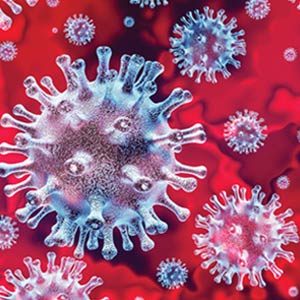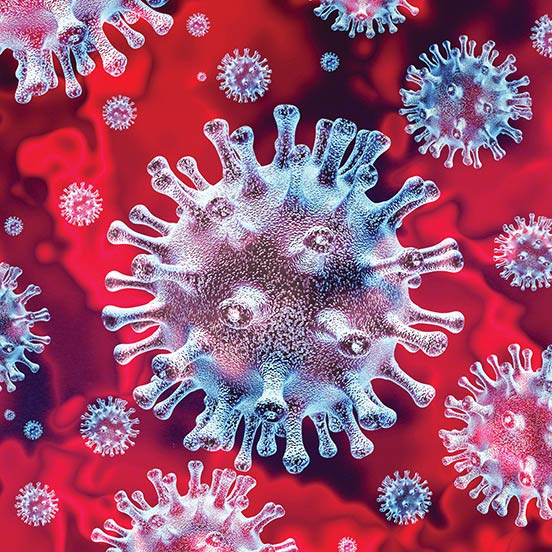What People With Kidney Disease Need to Know About COVID-19

Coronavirus (COVID-19) has had a global impact on people living with underlying medical conditions, such as chronic kidney disease (CKD). At Fresenius Kidney Care, we’re committed to providing you with the information and care you need to ensure your health and wellbeing.
Kidney disease and COVID-19 risk factors
According to the Centers for Disease Control and Prevention (CDC), people over the age of 65 and people of any age who have underlying medical conditions are at higher risk for serious illness from COVID-19. This includes people living with kidney disease and on dialysis, as well as people living with health conditions that may contribute to CKD, such as high blood pressure and diabetes.
The best way to lower your risk of COVID-19 is to avoid exposure to the disease. In addition to following the CDC’s recommended guidelines for social distancing and good hygiene, you can help protect your health and help avoid complications of chronic kidney disease by managing your health conditions exactly as directed by your doctor. Take steps to be your healthiest, such as:
- Completing all of your dialysis sessions
- Taking all of your medications as prescribed
- Following a kidney-friendly diet
- Controlling your blood sugar if you have diabetes
- Maintaining a healthy weight
- Getting enough sleep
- Managing stress
If you have any questions about your health and COVID-19, or concerns about getting your dialysis treatments, contact your care team. We’re here to support you at every step.
COVID-19 and complications of chronic kidney disease
COVID-19 is still a new disease, and there is limited information about how it impacts your health in different ways. The direct impact of COVID-19 on kidney disease has not been reported or proven, though there are certain risk factors for people on dialysis. According to limited research, people living with CKD may experience the following complications:
- Risk for acute kidney injury (AKI)
Some people who contract COVID-19 show signs of AKI, which could be a result of waste build-up and kidney injury caused by the virus. While the exact method of kidney involvement in COVID-19 is not clear, those on dialysis may be at higher risk for AKI. - Infection related to dialysis treatment
It’s important to continue your dialysis treatments as scheduled, even though it may require you to leave the house. To limit your risk of exposure to COVID-19 while going to the center, Fresenius Kidney Care has implemented extra safety precautions during in-center treatments or care team appointments to ensure your health and wellbeing. Talk to your care team about how to protect yourself during home dialysis as well.
Severe warning signs of COVID-19
Since people living with kidney disease or other underlying medical conditions may be more prone to serious illness from COVID-19, it’s important to keep an eye out for any of the following severe signs:
- Trouble breathing
- Persistent pain or pressure in the chest
- New confusion or inability to arouse
- Bluish lips or face
Contact your doctor or care team immediately if you are feeling unwell or experiencing any of these symptoms.
Guidelines for lowering COVID-19 risk in people with kidney disease
The best way to protect yourself against COVID-19 is to limit your contact with others, practice good hygiene, and follow your doctor’s instructions and CDC guidelines. To lower your chances of contracting the virus, take the following preventative steps:
- Stay home as much as possible.
- If you must go out for dialysis treatments or care team appointments, practice social distancing by staying at least 6 feet away from other people.
- Stay up to date on your annual influenza (flu) vaccine.
- Wash your hands often with soap and water for at least 40–60 seconds.
- Avoid touching your nose, mouth, and eyes.
- Clean and disinfect frequently touched objects and surfaces such as doorknobs, light switches, countertops, and handrails.
Steps to help you feel prepared and feel your best
- Stock up on enough medication, kidney-friendly food, and supplies to last 2–4 weeks.
- Get enough sleep.
- Avoid stressful situations and communicate with your social worker if you are feeling overwhelmed.
- Stay connected to your care team and loved ones.
Use telehealth to help you stay healthy
Talking to your care team about CKD and COVID-19
Your care team will also be able to help answer any questions about COVID-19 and kidney disease, such as:
- Am I at high risk for contracting COVID-19?
- How does COVID-19 impact my kidney health?
- How can I protect myself from contracting the virus?
- How can I prevent spreading COVID-19 to my family?
- What kind of supplies should I have in my house?
- What should I do if I’ve been exposed to someone with COVID-19?
- What are my treatment options?
If you or someone in your home are feeling sick or show any symptoms of the COVID-19—such as shortness of breath or a fever at or above 100.0° F—contact your care team immediately. They can give you instructions for getting the care you need.
Suggested topics

Home Dialysis and Coronavirus (COVID-19): Staying Safe

In-Center Dialysis and Coronavirus (COVID-19): Protecting Your Health
Your health is our top priority. As the COVID-19 situation continues to develop, we are taking additional steps in our dialysis centers to...
